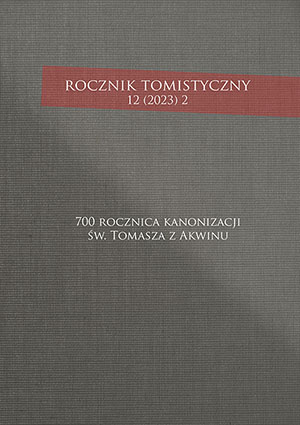Święty Tomasz z Akwinu o znaczeniu prawdy i mądrości oraz roli nauczyciela w zdobywaniu wiedzy, czyli co ważnego może wnieść filozof średniowieczny do współczesnej edukacji
Saint Thomas Aquinas on the Importance of Truth and Wisdom and the Role of a Teacher in Acquiring Knowledge, or what the Medieval Philosopher Can Bring to Modern Education
Author(s): Jacek BanaśSubject(s): Philosophy of Middle Ages, Philosophy of Religion, Philosophy of Education
Published by: Naukowe Towarzystwo Tomistyczne
Keywords: cognition; definition of truth; ontic (transcendental) truth; categorical truth; divine intellect; wisdom; teaching; teacher;
Summary/Abstract: The aim of the article is to show what the medieval philosopher (Thomas Aquinas) can say about the importance of truth and wisdom and the role of the teacher in acquiring knowledge. Although Thomas lived in the Middle Ages, his solutions are very actual. The Angelic Doctor refers to wisdom as the goal of education. The return to wisdom can be an effective counterbalance to all reductionisms that want to see school as a place of preparation for exams, for a profession or a place to acquire only practical knowledge. Wisdom that helps to organize the known reality in the light of universal principles and ultimate causes can become a factor integrating fragmentary school knowledge. The question of wisdom, in turn, is closely related to the problem of truth. The classical and realistic approach to the issue of truth adopted by Thomas Aquinas is a strong argument in the discussion with the relativism of truth, also present in the school. Aquinas’ position is also a justification for the intelligibility of things and a postulate for cognitive maximalism. By distinguishing between discovery and teaching, Thomas demonstrates that the latter is proper to the teacher. The teacher does not directly produce knowledge in his student, but affects the natural mind of the student only through signs (e.g. words), from which the student reads intellectual intentions and reproduces them in himself. The certainty of knowledge does not come from the teacher but from God, because by His light we know the universal principles that are the guarantee and source of certainty for the student. In addition, from the teacher we do not learn the rules, but the conclusions that are derived from these rules. From this point of view, the role of the teacher is limited and humble to the role of the proper teacher and true master, who is God. As for the role of the teacher in the educational process, Thomas combines the traditional approach (the teacher as a master) with the progressive approach (the teacher as only an advisor). The teacher’s mission, however, is momentous because it requires him to rethink his knowledge in his field. Teaching is also, according to Thomas, a kind of spiritual almsgiving - it is therefore a work of mercy towards the lack of knowledge and wisdom in those taught.
Journal: Rocznik Tomistyczny
- Issue Year: 2/2023
- Issue No: 12
- Page Range: 215-225
- Page Count: 11
- Language: Polish

